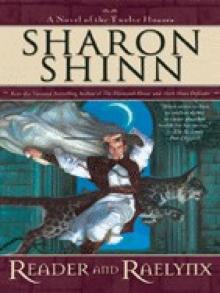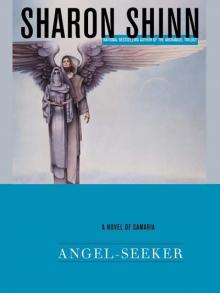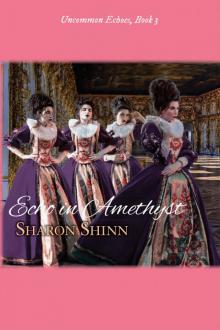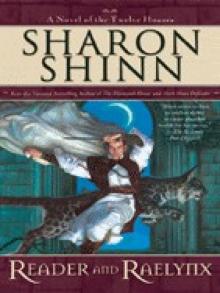- Home
- Sharon Shinn
Wrapt in Crystal Page 3
Wrapt in Crystal Read online
Page 3
“There is—a formality,” Benito said. Drake couldn’t tell from his impassive face if he approved of this particular rule or thought it was ridiculous. “Your fellow Moonchildren have agreed to it. I’ll give you a strongbox and we’ll lock the gun inside. I keep the key, you keep the box. This satisfies the letter of the law.”
“It wouldn’t be hard to break into a strongbox,” Drake pointed out.
“That’s why it satisfies the Moonchildren as well.”
Drake reached down and unstrapped the light, almost weightless Hawken from his hip. Although, like most Moonchildren, he was proficient with a variety of weapons and could, if he so chose, kill a man with his bare hands, this was the tool he preferred. “It’s your show,” he said.
A subordinate appeared at the door, the gun was encased in a rickety box of some stained green metal, and Benito solemnly slipped the key onto a ring he pulled from his uniform pocket. “Your driver is waiting,” he said, coming forward to offer Drake his hand. “You know that any resource I have is available to you.”
Drake clasped the strong fingers and released them. “I wondered,” he remarked, turning back at the door. “You never said. Do you worship with the Triumphantes or the Fideles?”
Benito had already seated himself behind the desk and picked up the file on some new case. The expression in his dark eyes was sad. “I have seen Ava’s harshest face,” he said. “I am a Fidele.”
* * *
* * *
The same slight, eager young officer served as Drake’s driver when they left the hombueno headquarters. Probably only he and Benito had any command of Standard Terran, Drake thought. They climbed into a small land vehicle with two front seats and no legroom and joined a hot, dusty, slow stream of ground traffic heading toward the heart of the hot, dusty city.
Drake had been dismayed, upon leaving the spaceport, to realize that most travel in Madrid seemed to be accomplished by land vehicles, but he was already resigned to it; he was not a man to rail against the fates. It was clear that intergalactic technological advances had come slowly to Semay when they came at all. This was unlikely to be his last inconvenience.
“Anybody fly here?” he called now over the drone of afternoon traffic. All the windows in the small car were open, and the noise of motion and exhaust made quiet conversation impossible.
“Pardon?” his guide called back. “Fly?”
Drake waved his arms languidly. It was too hot to expend much energy explaining himself. “Fly. Air transport. Scooters, bubbles, small planetary vehicles.”
The boy shook his head vigorously. “Not in city. In desert, yes, a few. In city all by land.”
Drake observed the ponderous interweaving of cars and jeeps and trucks in the miles ahead of him. “Must take forever to get anywhere,” he observed.
“Except for hombuenos,” the boy added.
“Pardon?” Drake asked in turn.
“Hombuenos. You would call them—police? Have air vehicles.”
Drake glanced around the interior of their small car, which had obviously seen a lot of service. “You’re police,” he said. “Where’s your air vehicle?”
The young man grinned at him. “Emergency only,” he explained.
It took them nearly half an hour to get to the hotel, a trip which could have been accomplished in minutes by an air car. The hotel was built of large white stones, so smooth and so well put together that they appeared to have been hewn whole from some gargantuan slab of silky marble. The high, arched doorways on the ground floor and the cavernous windows opening off every other level inspired Drake with a deep misgiving, and he was right: There was absolutely no artificial cooling system operating here. He stepped inside an enormous lobby shaded by unimaginably tall, thin trees that grew to the skylights in the distant roof. Bronze ceiling fans were suspended one hundred feet from the ceiling on thick gold chains, their blades turning so slowly it was possible to make out their decorative grillwork. It was not as hot inside as he would have expected; in fact, it was distinctly cooler than the oven outside. Even so. No air conditioning.
He stayed just long enough to sign the register and leave his bags with a small dark boy with a wide white smile. His escort had agreed to drop him off at the Triumphante temple before returning to his station, so he didn’t take the time to go up to his room. He could not imagine that the chamber would hold any surprises, for he could picture it already: high ceilings, white walls, lazy fan turning over a hard, severe bed. He had been in Semay only a few hours and already he was forming an accurate picture of its amenities.
* * *
* * *
He was surprised, therefore, at the opulence of the Triumphantes’ main temple. He stood before the wide, unlocked gate for a full ten minutes after his escort left him, and admired the pure beauty of the sanctuary. It had been built of a soft, rose-colored stone that gave it a look of twilight warmth even in the full heat of midafternoon. Elaborate friezes had been carved over every arched window and doorway; an intricate fountain played in the courtyard. Lining up on the long, wide porch outside the main door were twelve statues of women in various attitudes: One was dancing, one appeared to be singing, one lifted a laughing child high above her head. The frieze-work, the fountain, the statues and the bars of the gate were all dipped in what appeared to be high-karat gold.
Drake walked slowly forward, taking in other details. The courtyard was ringed with the same species of tall, thin tree that grew in the hotel lobby; the brushy leaves that sprang from the very tops of the plants spread umbrellas of welcome shade around the whole compound. Goldfish swam among the carvings in the fountain (and surely ornamental water was a precious luxury here on a desert world). The walkway leading to the temple door was paved with rose-quartz marble that exactly matched the temple walls.
A length of embroidered canvas hung before the door; Drake pulled it once, hard, when he stepped onto the porch. A bell sounded, sweet and faraway, somewhere inside the temple. Drake listened to birdsong from invisible larks in the five minutes it took before his summons was answered.
It could have been a child who peeped out at him from the cool darkness inside the temple. “Bonjorno, senyo bueno,” she said, greeting him, he thought, with “Good day, good sir.” Even those few words betrayed the lilt in her voice; she appeared to be laughing at him from the shadows. Involuntarily he smiled at her.
“Amica Jovieve,” he said painstakingly. “Please. Por-vore.”
The girl giggled, too late covering her mouth with her hand. She asked him something in a flurry of Semayse that he did not understand a word of. Probably asking him his business.
“Soy Cowen Drake,” he said, hoping that was the correct verb. “I want—Querro amica Jovieve.”
She spoke again, but this time her words did not end in an interrogative tone, so he assumed she had told him to wait right there. In any case, he did not move and she disappeared. He listened to her footsteps patter down the hall. Even that remote, fluttering sound was cool; everything in this place seemed cool and restful.
He waited only a few more minutes before the brisk sound of footsteps echoed again down the long hallway and a second dark, laughing face blinked out at him. Only this time, the face belonged to a woman, not a girl, and the intelligence behind the amusement was immediate and unmistakable.
“I can’t believe Lusalma left you out here to blister in the sun,” were the first words out of her mouth, in perfectly unaccented Standard Terran. She had a voice like rainwater, smooth and soothing. “Come in. Please. It’s so hot out today.”
He stepped inside and it was like plunging into deep water. He felt instantly surrounded by an immense and buoyant element. The relief from the heat was sudden and shocking. He felt sweat dry on his skin and he hadn’t even known he’d been sweating.
“I’m Jovieve,” she continued, leading him down the rosy hallway. “I think you must be the Moonchild we ha
ve been expecting.”
He nodded. “I’m Lieutenant Cowen Drake,” he said. “Call me Drake.”
She looked at him sideways. In the shadows, he could not get a clear view of her face, but she seemed to be smiling still. “Oh, no, Cowen, surely?” she murmured.
He was surprised into a short laugh. “Not a name I’ve used much,” he admitted. “What I meant was, you don’t need to call me lieutenant.”
“I won’t, then, once I’m used to you.”
She had found her way to an arched doorway closed by a high wooden door. Pushing this open, she entered, and he followed. Cool as the hallway, this room was brighter, though the arid sun was filtered out by a delicately tinted stained glass window. The graphic formed by the colored panes of glass appeared to be of a woman surrounded by butterflies and dancing in a field.
“I’ve asked Noches to bring us something to drink,” she said, settling gracefully onto an overstuffed cloth couch. “Please. Sit down. I am trying to organize my mind so that I am helpful and efficient, but I’m afraid you will have to ask a great many questions. It has been a fractured day, and my mind is in a million places.”
He settled down beside her, half turned to face her, and smiled. In the better light he took the time to study her fine, white features, her face dominated by extremely large brown eyes. She was not a young woman—older than he was, he thought, and he was a year past forty—but her skin had been so well cared for that it was hard to tell. He thought she might be wearing cosmetics, which surprised him somehow. He did not think of the devout as being vain. But the expression on her face was anything but self-centered. She watched him frankly, and he could see wheels clicking around in her head as fast as they were whirling in his.
Start soft; that had always been his motto. “Lusalma?” he repeated. “And Noches? Jovieve?”
She laughed aloud, a rich and luxurious sound. He thought this woman must personally make a lot of converts. “Yes, the names are quite exotic, aren’t they?” she said. “Blame it on our heritage, which stretches back to some impossibly romantic culture from Old Earth. Since our names are religious ones, they are even more exotic than most Semayans can claim.”
“Do they mean something?”
“Well, they are all variations of words and phrases that at one time meant something. Many of them have been twisted so much from their roots that no purist would ever recognize them. Jovieve, for instance. At one time it was Joie de Vivre. Joy in Life. But it has been so mangled and mispronounced over the years that no one can remember to say it properly.”
“Still, that’s a pretty thought. Joy in life.”
“They’re all pretty thoughts. The Triumphantes believe that the goddess has called each of us to her house to be joyful and celebratory, and so we begin with how we name ourselves.”
“What do the other names mean? Lusalma? Noches?”
She laughed again. “Well, Noches is short for Nochestrella, which means, roughly, Night of Stars. Lusalma—Luz Alma if one pronounced it correctly—means Soul of Light.”
He was utterly intrigued. How would he name himself if he were to sum up his identity in one or two succinct words? “You choose your own names?” he asked.
“Sometimes. Most often the novitiates come to us with their old names, their common names, and these are used for the first year. By the end of that time, they have developed such distinct personalities that someone—a teacher or a classmate, usually—has applied a name to them and it seems so apt that it sticks.”
Before he could reply, a knock sounded and the door opened. A sweet-faced, fair-haired girl entered, bearing a tray of drinks. She and Jovieve exchanged a few murmured words; then the girl smiled at Drake and departed.
The drink tasted like the local version of lemonade, and it was very good. Drake sipped his, watching Jovieve.
“You have not asked me any questions yet,” she said, watching him in return.
“I am wondering how to begin. There is so much that I need to know.”
“Such as?”
“I need to know what the women were like—the ones who were murdered. I need to know why someone might have wanted to murder them—why someone might have wanted to strike at the Triumphantes in general or these women in particular. That means I need to know about the Triumphantes, who they are, what they believe, who follows them and who doesn’t and why. I need to know what makes them different from the Fideles. I need to know everything.”
A shadow had fallen across the amica’s face at his first words. “One thing I can tell you,” she said. “No one could have wanted to strike at those three women in particular. No one could have hated them. No one could have wanted to hurt them.”
“You don’t know that,” he said gently. “Let’s start with them.”
She nodded slowly and fixed her eyes on the fabric of the couch before her. “Very well. The first to die was Besadulce—Sweet Kiss. Sweet Kiss of the Goddess, it means; it is a line from an old hymn. She came to us when she was a child, no more than seven or eight. The Triumphantes run several orphanages and one day she showed up at one of them, all alone, hungry, tattered. But cheerful. Smiling. Always did her share of work, and helped with the younger children, and always was first in the temple for prayers or devotions. She was the youngest novitiate ever, but it never occurred to any of us to doubt that she was prepared to accept the goddess into her life. She had so clearly been marked by Ava to be one of us.” Jovieve looked gravely up at Drake. “She was the first one to be killed.”
He had activated a small recorder when she began speaking. “Her parents? Her family?” he asked. “Did you ever discover where she had come from?”
“No. Somewhere in the oldtown slums, I always supposed. We asked, but she would turn away and grow silent, and she never told us anything. But no one ever came looking for her. I checked with the hombuenos more than once, and a child matching her description was never reported. She was not looked for.”
“And the others?”
“Corazon was an older woman who came to us after her husband died. Her children were grown, she had few ties to the world. She was a wealthy woman who brought her wealth with her to the church—it is often the way of it,” Jovieve added as an aside. “Especially among the more monied people on Semay. An older woman who feels her life has little purpose anymore will come to us to renew herself. Among some families it is actually fashionable, and these women do not take their vows as seriously as the rest of us. But it comforts them to come to us, and it enhances the prestige of the church, and these women are always welcome.”
“Was Corazon such a woman?”
Jovieve lifted her hands expressively. “She was perhaps more devout than some of the other converts we have had. She believed more deeply. I think she had for years enjoyed the vision of herself as a devoted daughter of Ava, and that picture sustained her as much as the reality did.”
“And her family? How did they feel about her bringing her wealth to the Triumphante coffers?”
Jovieve lifted her eyebrows. “Lieutenant Drake,” she said softly, “any man, any woman, considers it a great honor to give of his or her worldly goods to the goddess.”
“I’m sure that’s the rhetoric,” he said pleasantly, “but some people might say one thing with their mouths and feel another thing in their hearts.”
She laughed, and he realized she had been teasing him. This woman was no fool, blinded by dogma; she was very conversant with the currents of the human heart. “Corazon had two sons and a daughter,” she said. “I believe the daughter was pleased that her mother had chosen to come to us, for this daughter felt she might otherwise be required to care for her mother herself. Her sons, on the other hand, seemed to feel some resentment that Corazon’s wealth had slipped through their fingers. That was pure greed, you understand—their father left them exceptionally well provided for. But, as you say, some people are not quite so happy with t
he honor of seeing their money flow into purses other than their own.”
“Greed can be a powerful goad,” Drake said. “Resentment also.”
“Powerful enough to incite a man to murder his mother and five other women?” Jovieve asked softly. “I hardly think so.”
Drake shrugged. “And the third woman?”
Jovieve sighed. “Mariposa. Never was a girl so well-named.”
“What does it mean?”
“Butterfly. Charming, happy girl, but so restless, so disorganized, so impossible. She too came from a wealthy family—she was brought to us by her parents, who had five daughters. This is the way we most often receive novitiates, from the hands of family members who have decided their relative should dedicate her life to the goddess.”
“Was Mariposa willing to join your order?”
“Oh yes! Quite delighted. We have a reputation for a lighthearted love of the goddess, of our fellow men—the Triumphantes are no grim and celibate order, you know, and many of the young women who come to us see only the celebratory side of our devotions. Mariposa was one of those. Really, she was quite happy to be here most of the time, but the work was harder than she expected, and it was not always quite as much fun as she had thought, and she was expected to behave with a little more propriety than she was always willing to show . . . She was something of a problem child, but girls her age often are. We loved her, nonetheless. Everyone did.”
He found himself wanting to say someone didn’t in an ominous tone of voice, but he refrained. On the surface, it did not look like family or friends would have any motive for doing away with the irresponsible Mariposa. “There seems,” he said deliberately, “to be no particular link between these three women.”
“None at all,” Jovieve said promptly. “They were nothing alike in temperament, in background, in age, in looks.”
“Were they—was there some project the three of them worked on at some time, some other way they could be linked together?”

 Jenna Starborn
Jenna Starborn Troubled Waters
Troubled Waters The Thirteenth House
The Thirteenth House Reader and Raelynx
Reader and Raelynx Angel-Seeker
Angel-Seeker Archangel
Archangel Jeweled Fire
Jeweled Fire Nocturne
Nocturne The Shape-Changer's Wife
The Shape-Changer's Wife Still Life With Shape-Shifter
Still Life With Shape-Shifter Quatrain
Quatrain Fortune and Fate
Fortune and Fate Angelica
Angelica Summers at Castle Auburn
Summers at Castle Auburn Echo in Amethyst
Echo in Amethyst The Turning Season
The Turning Season Mystic and Rider
Mystic and Rider Heart of Gold
Heart of Gold The Shape of Desire
The Shape of Desire Echo in Onyx
Echo in Onyx Royal Airs
Royal Airs Gateway
Gateway The Safe-Keeper's Secret
The Safe-Keeper's Secret Wrapt in Crystal
Wrapt in Crystal Unquiet Land
Unquiet Land Jovah's Angel
Jovah's Angel Dark Moon Defender (Twelve Houses)
Dark Moon Defender (Twelve Houses) Mystic and Rider (Twelve Houses)
Mystic and Rider (Twelve Houses) Fortune and Fate (Twelve Houses)
Fortune and Fate (Twelve Houses) Reader and Raelynx (Twelve Houses)
Reader and Raelynx (Twelve Houses)